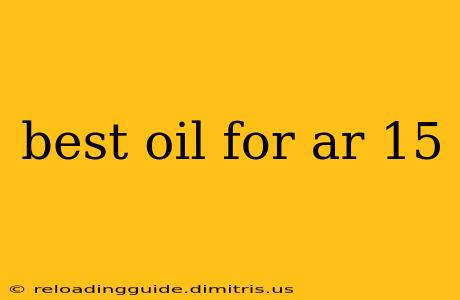Choosing the right oil for your AR-15 is crucial for maintaining its reliability, accuracy, and longevity. The wrong lubricant can lead to malfunctions, increased wear, and even damage to your firearm. This comprehensive guide will help you navigate the world of AR-15 oils and find the best one for your needs.
Understanding AR-15 Lubrication Needs
The AR-15 platform, with its intricate moving parts and tolerances, demands specific lubrication characteristics. The ideal oil should offer:
- High-temperature stability: The friction generated during firing can cause significant heat buildup. Your oil must resist breaking down under these conditions.
- Low-temperature fluidity: Ensuring smooth operation in cold environments is vital. The oil needs to flow freely even when temperatures drop.
- Corrosion protection: Protecting metal components from rust and corrosion is critical, especially in humid or wet conditions.
- Cleanliness: The oil shouldn't attract or retain dirt and debris, which can accelerate wear.
- Compatibility: Ensure the oil is compatible with all the materials used in your AR-15, including polymers and other synthetics.
Types of AR-15 Oils
Several types of oils cater specifically to the demands of AR-15 rifles. Let's explore the most common:
1. CLP (Cleaning, Lubricating, Protecting):
CLP is a popular all-in-one solution, simplifying the cleaning and maintenance process. Many manufacturers produce CLP specifically formulated for firearms, boasting a blend of cleaning solvents and lubricating oils. Advantages: Convenience. Disadvantages: May not provide the same level of specialized lubrication as dedicated oils in extreme conditions.
2. Synthetic Oils:
Synthetic oils offer superior performance compared to traditional petroleum-based oils. They exhibit better high-temperature stability, low-temperature fluidity, and resistance to breakdown. Advantages: Superior performance in extreme conditions. Disadvantages: Often more expensive than CLP or petroleum-based oils.
3. Petroleum-based Oils:
These are more traditional oils, often less expensive than synthetics. Advantages: Cost-effective. Disadvantages: May not perform as well in extreme temperatures or offer the same level of protection against corrosion.
Factors to Consider When Choosing an AR-15 Oil
Beyond the oil type, several other factors should influence your decision:
- Environment: If you operate your AR-15 in extreme conditions (very hot or very cold), a high-quality synthetic oil is recommended.
- Frequency of Use: For frequently used rifles, more frequent lubrication is necessary, making a high-quality oil even more critical.
- Personal Preference: Some shooters swear by specific brands or types of oil based on their experience.
Recommended Oils (Without Endorsement)
Many reputable manufacturers produce oils suitable for AR-15s. It's crucial to conduct your own research and read reviews before selecting a product. Pay close attention to user feedback regarding performance in various conditions.
Remember, consistent cleaning and lubrication are vital for maintaining your AR-15. Refer to your firearm's owner's manual for specific maintenance recommendations.
Conclusion
Selecting the best oil for your AR-15 is a personal choice based on your specific needs and operating environment. By understanding the characteristics of different oil types and considering the factors discussed above, you can make an informed decision and ensure your firearm receives the best possible care. Always prioritize high-quality products to maintain the accuracy and reliability of your AR-15.

